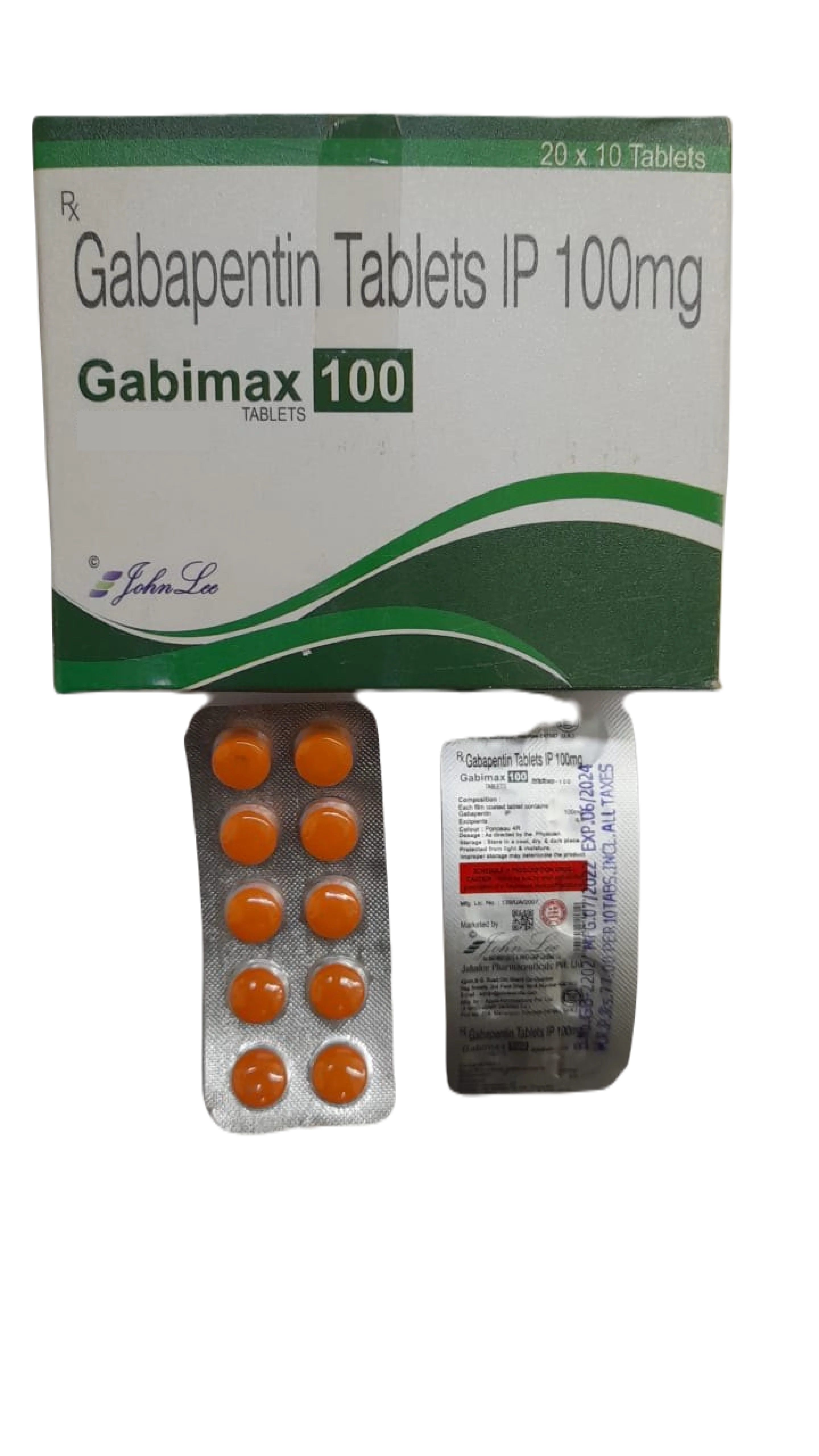It helps in Seizure Management. Apart from pain relief, doctors prescribe Gabimax 100mg for epilepsy and seizures, making it a dual-purpose medication. It has minimal Gastrointestinal Side Effects and does not cause ulcers, gastritis, or kidney damage like NSAIDs. It does not cause constipation like opioids and is safe for Long-Term Use. Patients tolerate Gabimax 100mg well for chronic conditions, with a low risk of severe side effects. It enhances Sleep & Anxiety Relief. Many patients find Gabimax improves sleep quality and reduces anxiety, especially for those with nerve pain. FDA-Approved & Clinically Tested, Gabimax ensures high safety standards and efficacy as a non-opioid analgesic.
What is Gabimax 100mg?
Gabimax (Gabapentin) is not a typical painkiller like NSAIDs or opioids. Instead, it changes how the nerve signals work or communicate in the brain and spinal cord to relieve pain.
- Targets Overactive Nerve Signals
Gabapentin binds to calcium channels in nerve cells. It reduces the release of excess excitatory neurotransmitters (like glutamate). As a result, it calms down the hyperactive nerve activity that causes neuropathic pain.
- Blocks Pain Transmission
By reducing nerve excitability, Gabimax prevents pain signals from reaching the brain. It makes it highly effective for conditions like diabetic nerve pain, fibromyalgia, and sciatica.
- Controls Seizures (Dual Benefit)
Gabapentin stabilizes electrical activity in the brain, helping to prevent seizures in epilepsy patients.
- Enhances GABA Effects (Calming Effect)
Though it does not directly increase GABA, it enhances GABA-like activity, which has a calming, anti-anxiety, and sleep-enhancing effect.
This unique nerve-targeting mechanism makes Gabimax 100mg an excellent choice for chronic nerve pain, epilepsy, and anxiety relief without the risks of opioids or NSAIDs.
What are the Uses and Benefits of Gabimax 100mg?
Gabimax 100mg is a highly effective nerve pain reliever widely used for multiple conditions beyond just pain management.
Key Uses of Gabimax 100mg
Neuropathic Pain (Nerve Pain Relief)
- Diabetic Neuropathy (nerve damage because of diabetes)
- Postherpetic Neuralgia (shingles-related nerve pain)
- Sciatica (lower back and leg nerve pain)
- Fibromyalgia (widespread muscle & nerve pain)
- Spinal Cord Injury Pain
- Seizure Control (Anti-Epileptic Use)
Used as an add-on therapy for partial seizures in epilepsy patients.
Anxiety & Sleep Disorders
It helps in reducing anxiety, especially in patients with chronic pain.
Gabimax improves sleep quality by calming the nervous system.
Restless Leg Syndrome (RLS)
Relieves uncontrollable leg movements at night, improving sleep.
Migraine Prevention (Off-Label Use)
Doctors prescribe it to reduce migraine frequency.
Benefits of Gabimax 100mg
- Highly Effective for Chronic Nerve Pain–Unlike regular painkillers, it targets the root cause (overactive nerve signals).
- Non-Opioid, No Addiction Risk–It is safe for long-term use without dependency.
- Fewer Gastrointestinal Side Effects–It has a lower risk of stomach ulcers or kidney damage than NSAIDs.
- Dual Action–It works for both pain relief and epilepsy.
- Improves Sleep & Anxiety–Has a calming effect that reduces anxiety & promotes better sleep.
What are the Safe Dosages of Gabimax 100mg?
Gabimax dosage usually starts at a low dose and gradually increases for better tolerance.
Recommended Dosage for Different Conditions
Neuropathic Pain (Nerve Pain Relief)
- Starting Dose: 100-300mg once daily (preferably at bedtime).
- Titration: Increase by 100-300mg every 3-7 days, based on response.
- Maintenance Dose: 900-3600mg daily (divided into 2-3 doses daily).
Seizures (Epilepsy Treatment)
- Starting Dose: 300mg per day (divided into three doses).
- Titration: Increase every 2-3 days up to 900-1800mg/day.
- Maximum Dose: 3600mg/day (in divided doses).
Anxiety & Sleep Disorders
- Starting Dose: 100mg to 300mg before bedtime.
- Maintenance Dose: 300-1200mg per day, depending on the severity of anxiety or insomnia.
Restless Leg Syndrome (RLS)
- Dose: 300-600mg before bedtime.
Migraine Prevention (Off-Label Use)
- Dose: 300-1200mg per day in divided doses.
Important Dosage Guidelines
- Take with or without food, preferably at the same time each day.
- Do not stop suddenly—gradual tapering is required to prevent withdrawal symptoms.
- Your doctor may alter the dosage for kidney disease—consult your doctor if you have kidney issues.
How to take Gabimax 100mg?
Step-by-Step Guide on How to Take Gabimax
Take as Prescribed
Follow your doctor’s dosage instructions carefully.
Do not increase or decrease the dose without medical advice.
Best Time to Take It
- For nerve pain & anxiety: Take it at bedtime to avoid drowsiness during the day.
- For epilepsy: Take it at evenly spaced intervals (2-3 times daily).
- For restless leg syndrome: Take it 2 hours before bedtime.
With or Without Food?
You can take it with or without meals, but taking it with food reduces stomach discomfort.
Swallow Whole
Swallow with a full glass of water. Do not crush, chew, or break the capsule.
Did you miss a dose?
Take it as you remember, or skip it if it is close to your next dose—do not double dose to catch up.
Do Not Stop Suddenly
Stopping may cause withdrawal symptoms or exacerbate seizures/pain.
Always reduce the dose gradually under a doctor’s supervision.
Alcohol & Drug Interactions
Avoid alcohol—it increases dizziness and drowsiness.
Check with your doctor before mixing with other medications.
When Should I Avoid Gabimax 100mg or Use Gabimax 100mg Cautiously?
While Gabimax 100mg is highly effective for nerve pain, seizures, and anxiety, there are certain situations where you should avoid or use Gabimax 100mg with caution.
Avoid Gabimax 100mg If You Have
Severe Allergic Reactions to Gabapentin
Symptoms are rashes, swelling, breathing difficulties, or severe dizziness.
Kidney Disease (Severe Renal Impairment)
The kidneys excrete Gabapentin, so if you have mild kidney ailment, you need dose adjustments.
Respiratory Issues or Breathing Disorders
It can cause slow or difficult breathing, especially in older or COPD patients.
History of Drug or Alcohol Abuse
Though non-addictive, Gabapentin can cause dependence in some users.
Avoid combining it with opioids or alcohol.
Uncontrolled Mood Disorders (Depression or Suicidal Thoughts)
Gabapentin may increase depression or suicidal thoughts in some individuals.
Monitor mood changes closely.
Pregnancy & Breastfeeding
Not recommended. It can pass into breast milk. Consult a doctor if nursing.
Use Gabimax 100mg Cautiously If You Have
Liver Disease–Though primarily processed in kidneys, discuss dosage adjustments with your doctor.
Older Patients above 65– increased risk of drowsiness, falls, and confusion and need lower doses.
Driving or Operating Machinery–This can cause dizziness, drowsiness, or blurred vision. Avoid risky activities until you know how it affects you.
Diabetes–Gabapentin can sometimes cause swelling in the legs (peripheral edema), which may worsen diabetic foot conditions.
Mixing with Other Medications–Avoid taking it with opioids, alcohol, or sleep medications due to increased sedation risk.
What are the Side effects of Gabimax 100mg?
Common Gabimax 100mg Side Effects
- Dizziness–lightheaded or off-balance
- Drowsiness–sleepiness, especially at the beginning
- Fatigue–tired or lacking energy
- Coordination Problems–Unsteady walking or clumsiness
- Blurred Vision–Vision may be slightly hazy
- Dry Mouth–A mild decrease in saliva production
- Mild Nausea or Upset Stomach–Reduced when taken with meals
- Weight Gain–caused by increased appetite in some users
- Swelling in Hands or Feet (Edema)–Fluid retention, more common in diabetics
Severe Gabimax 100mg Side Effects
- Severe Allergic Reactions (Anaphylaxis)
- Respiratory Depression (Slow Breathing)
- Suicidal Thoughts & Mood Changes
- Severe Dizziness, Confusion, or Memory Loss
- Muscle Weakness & Unusual Pain
- Swelling & Severe Fluid Retention
- Seizures Worsening (For Epilepsy Patients)





